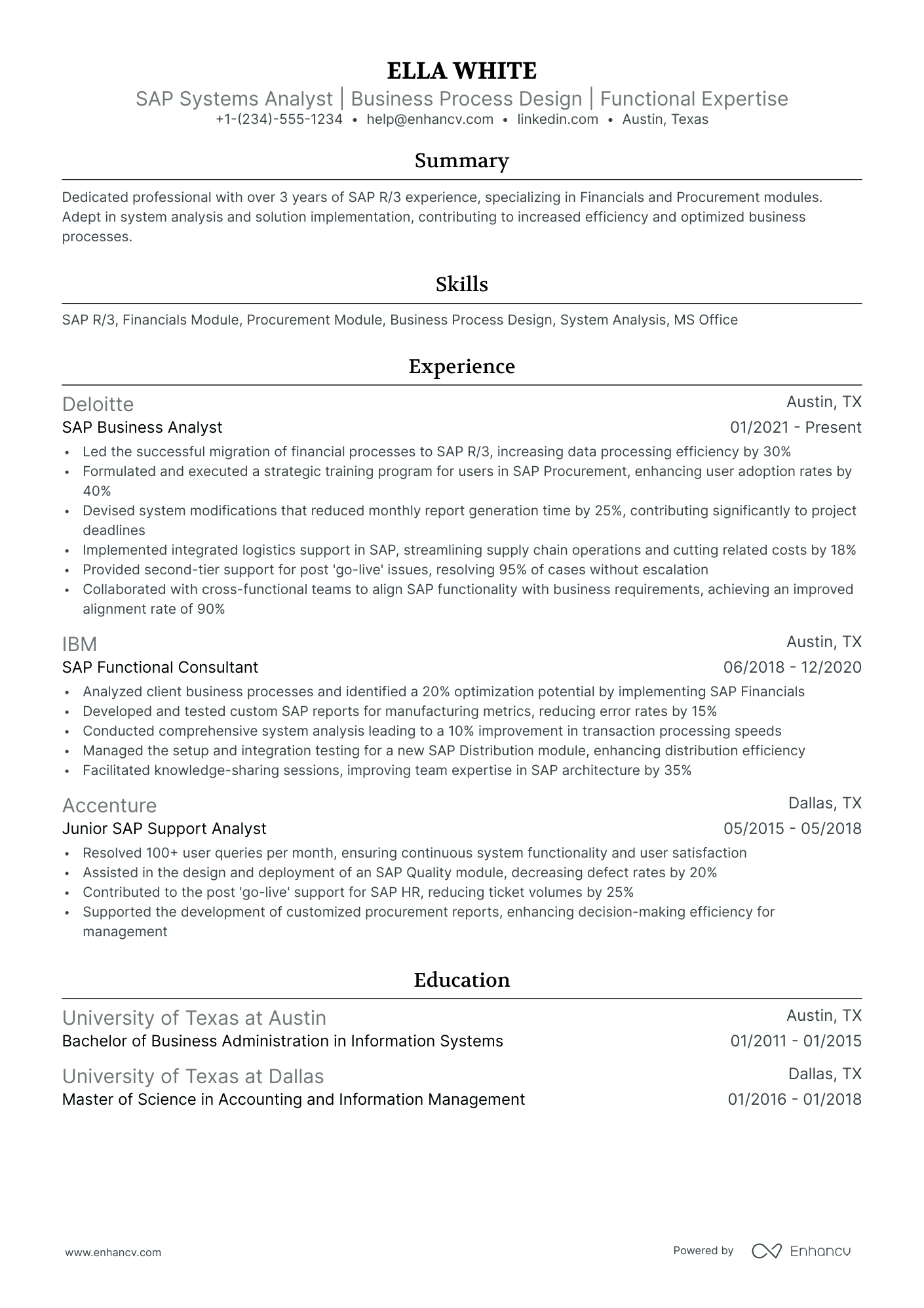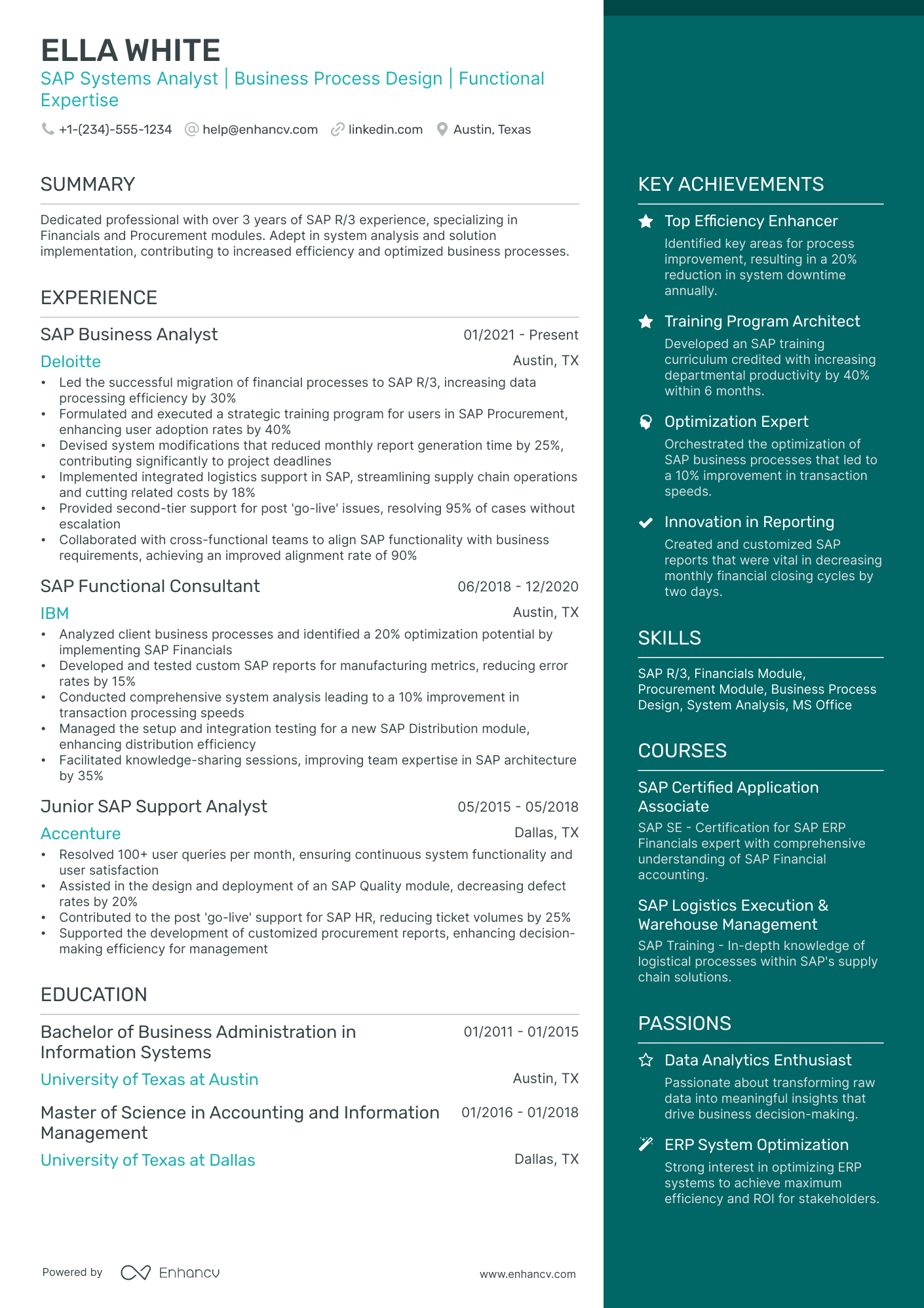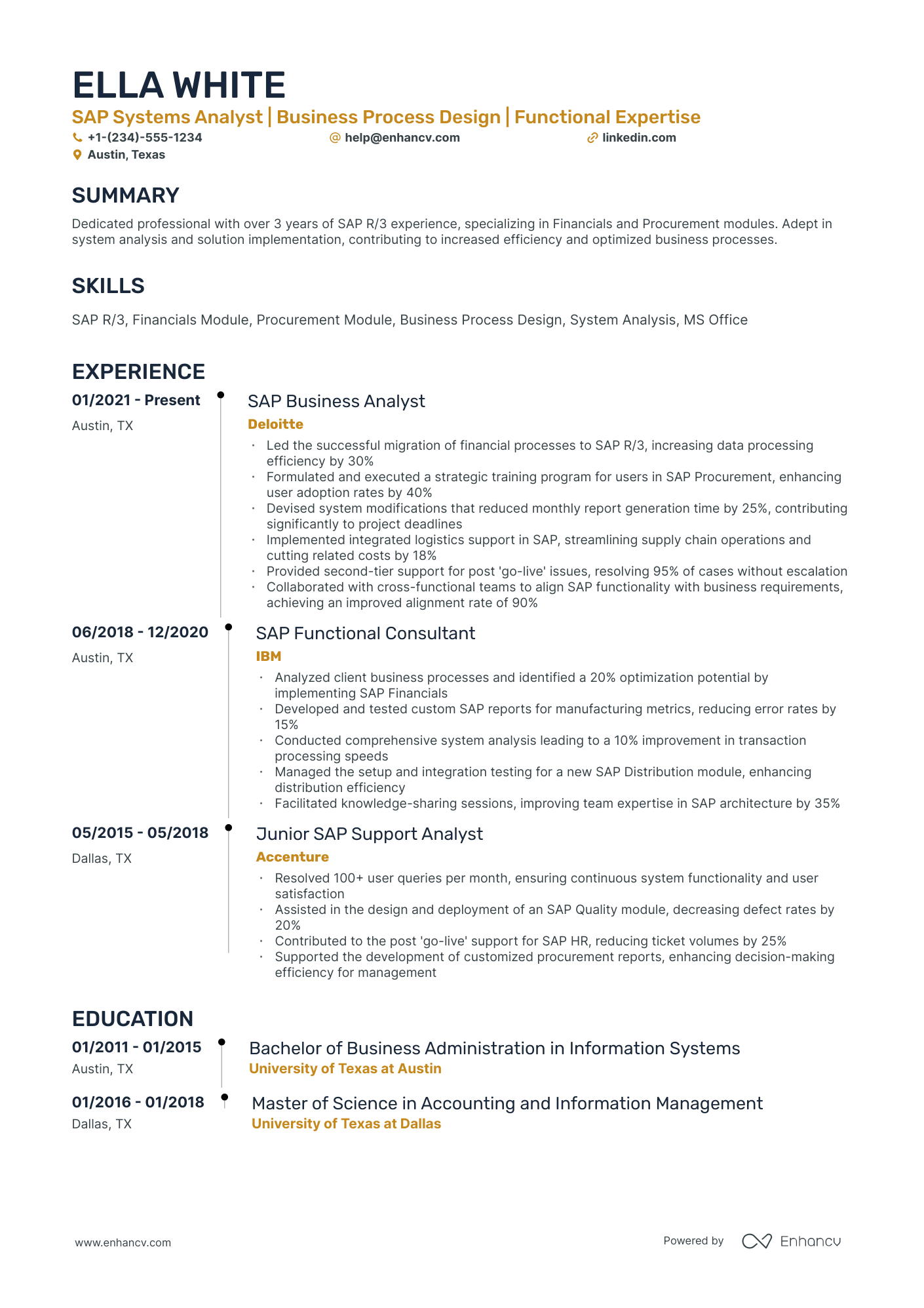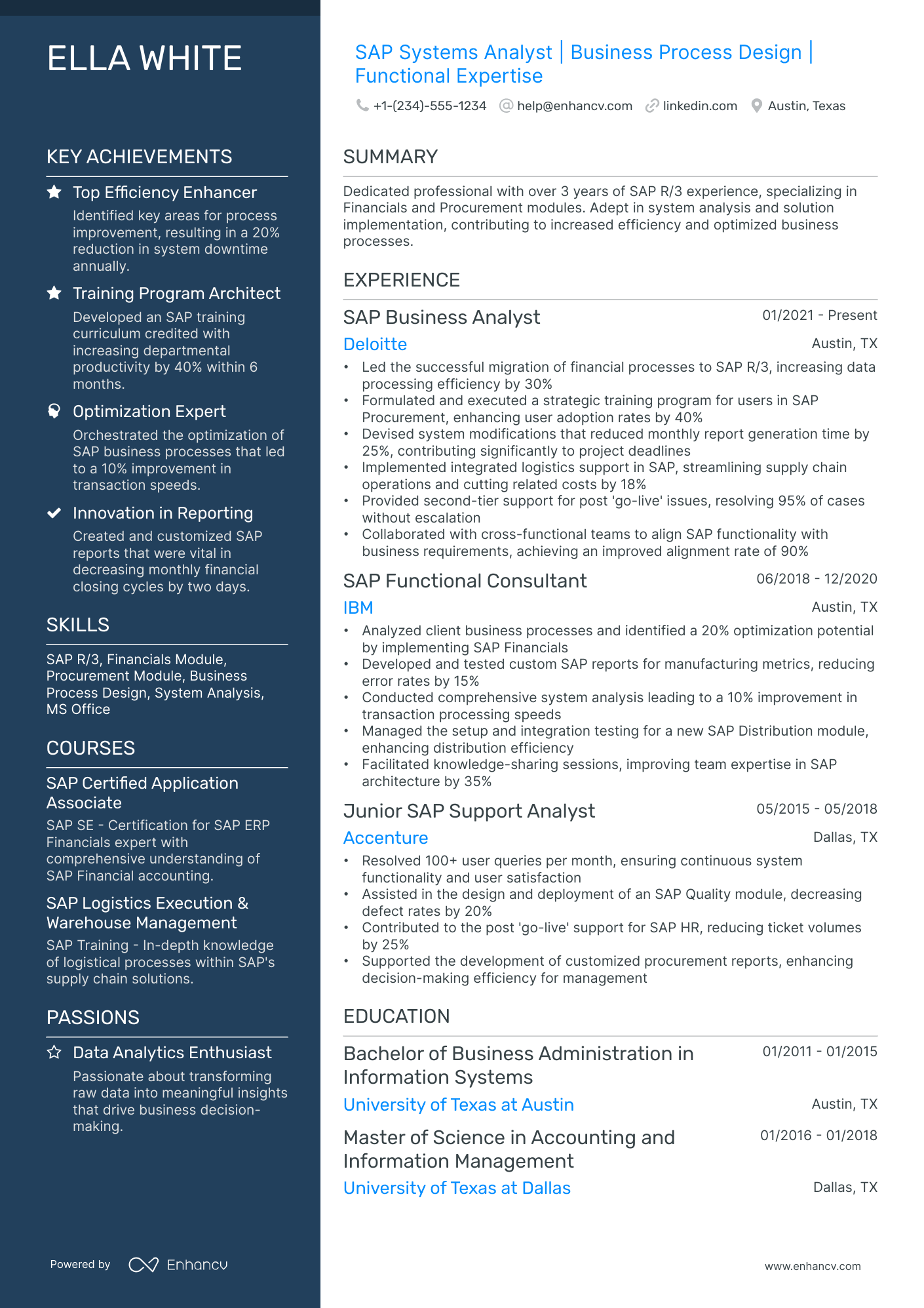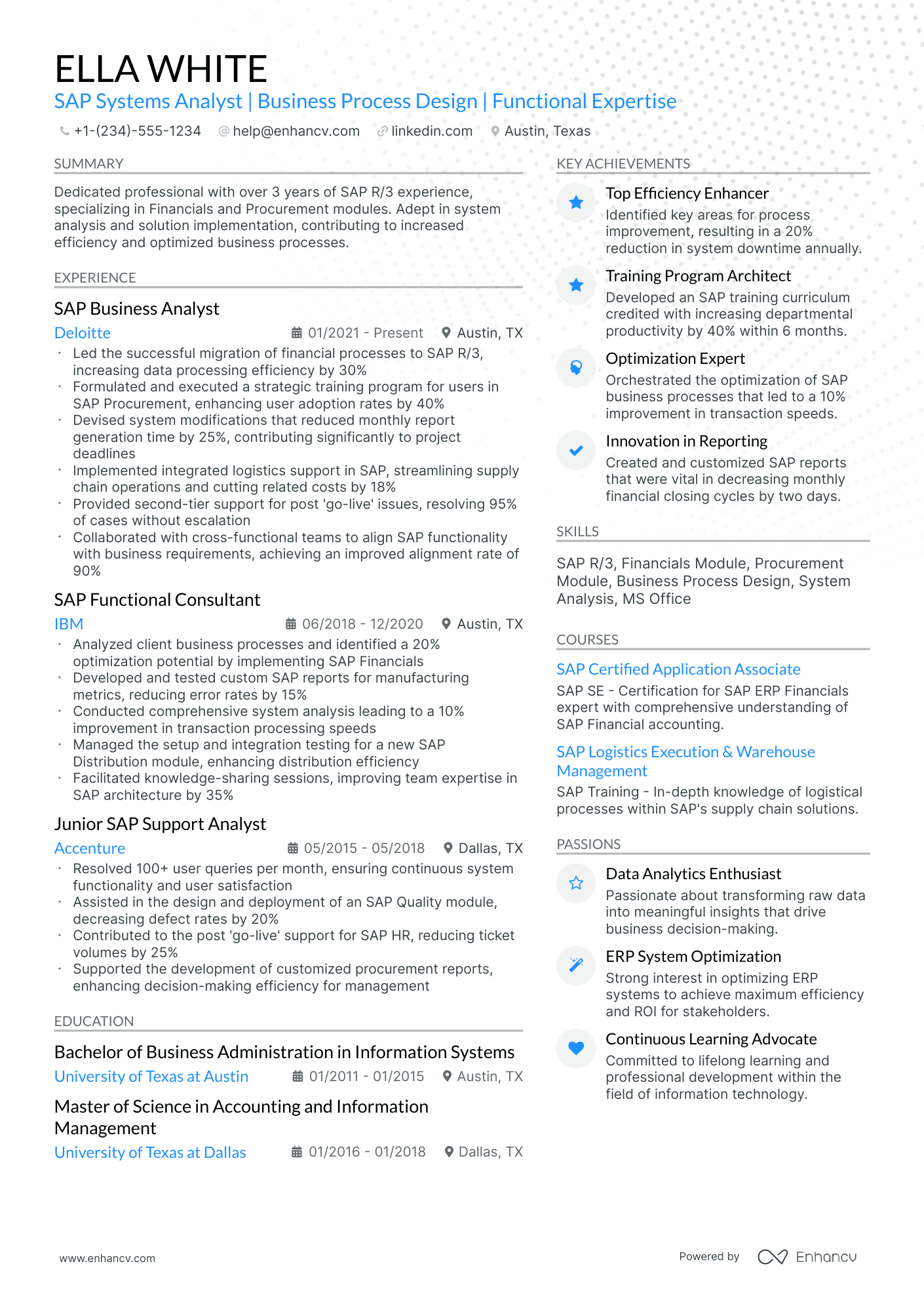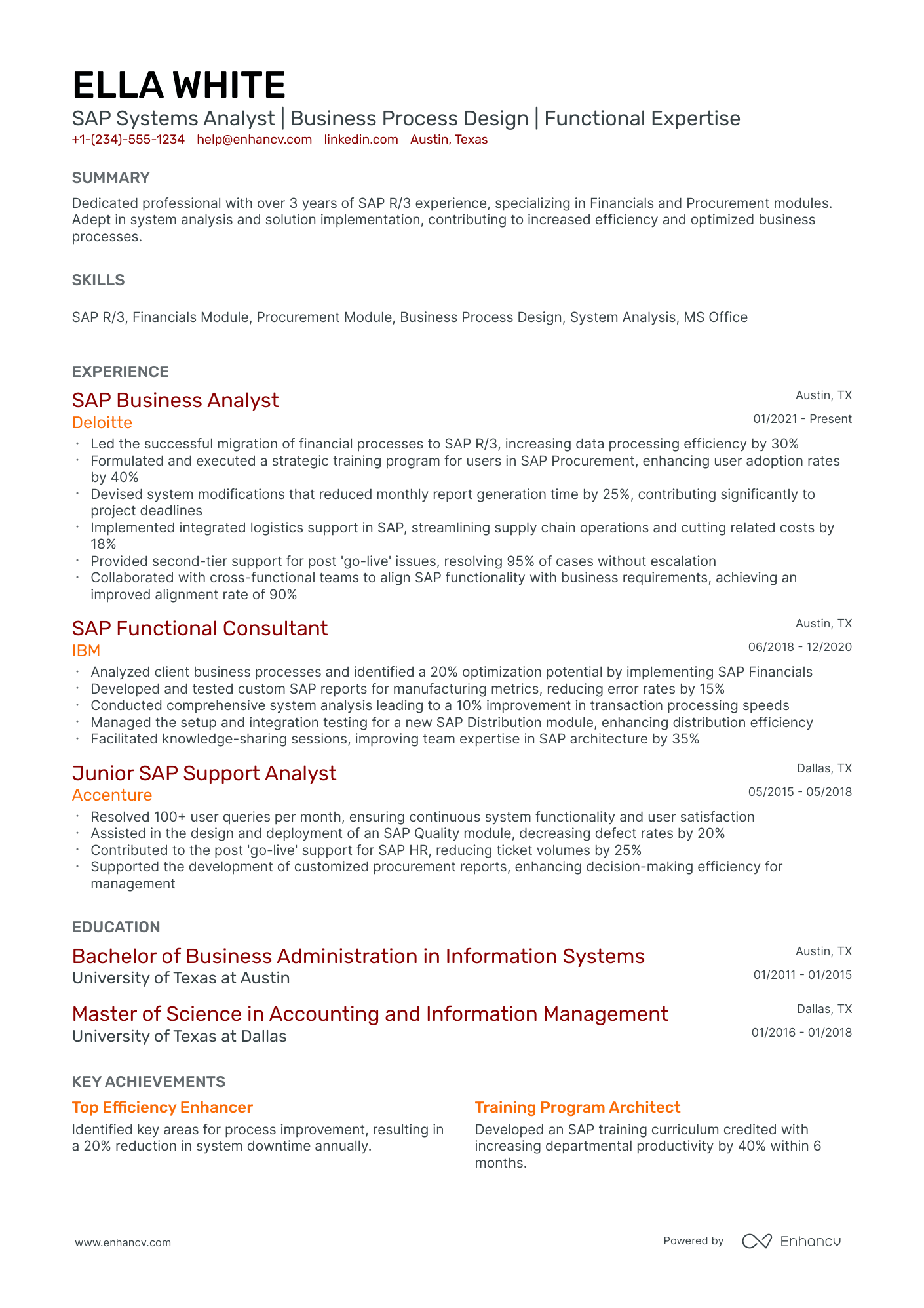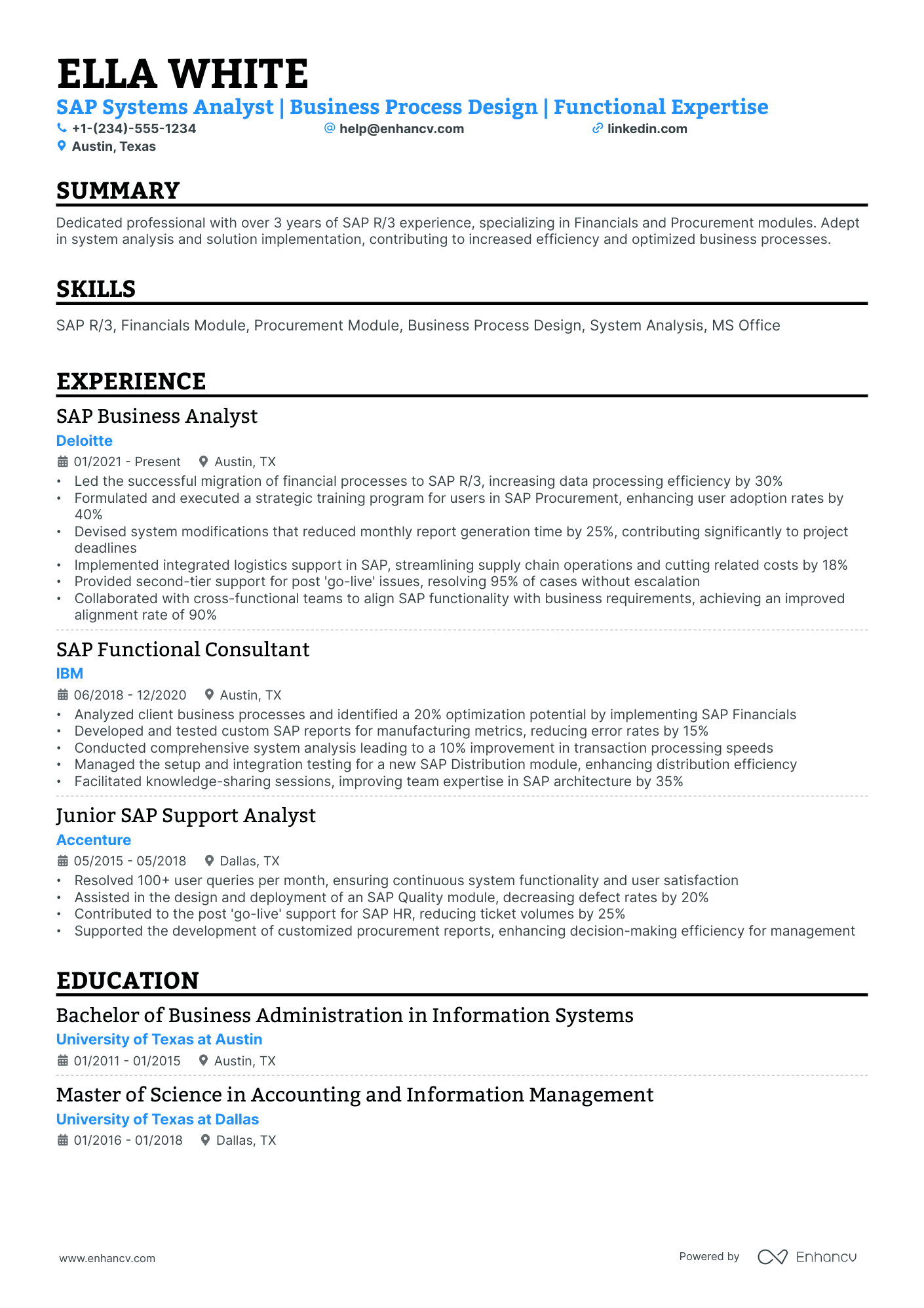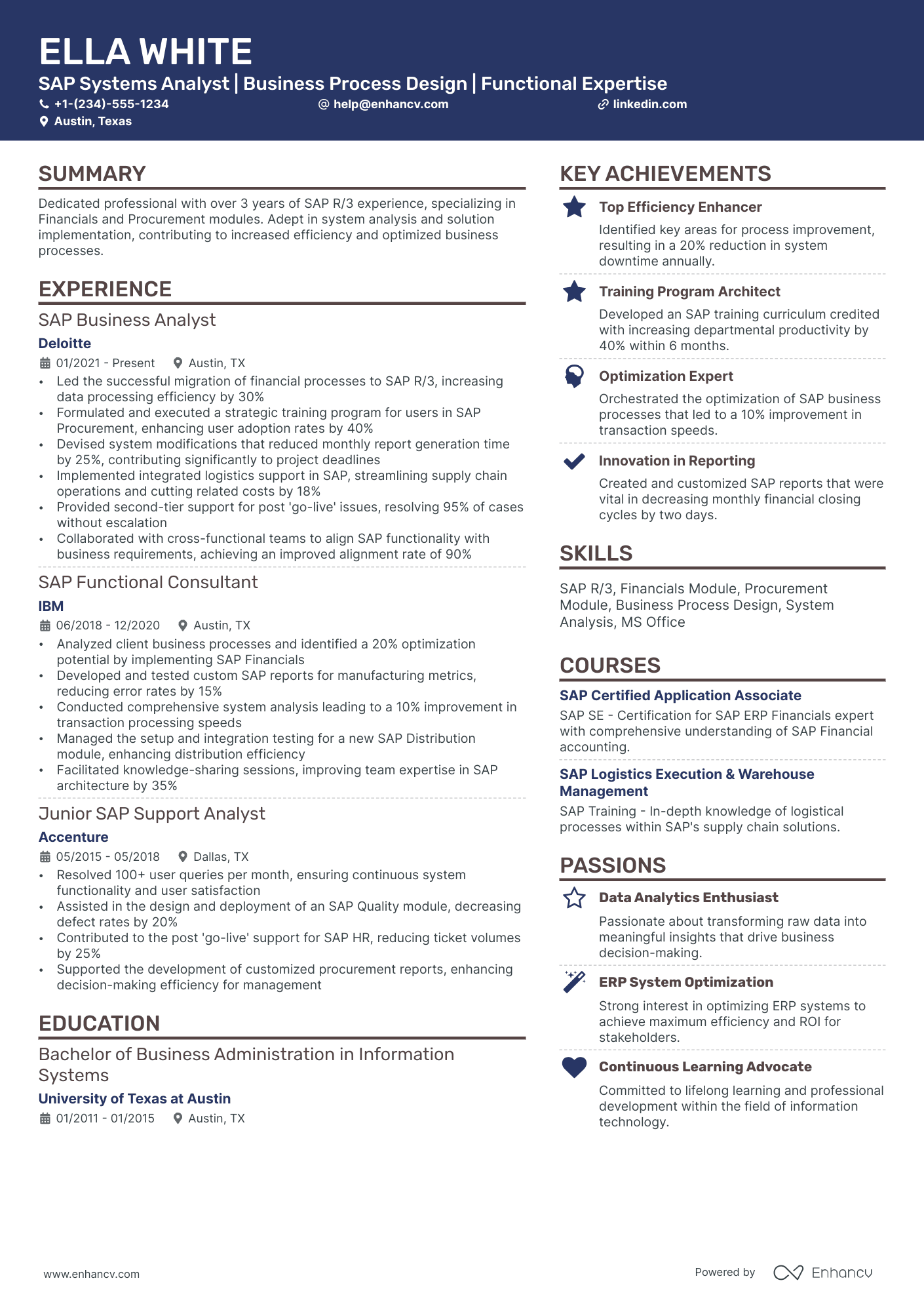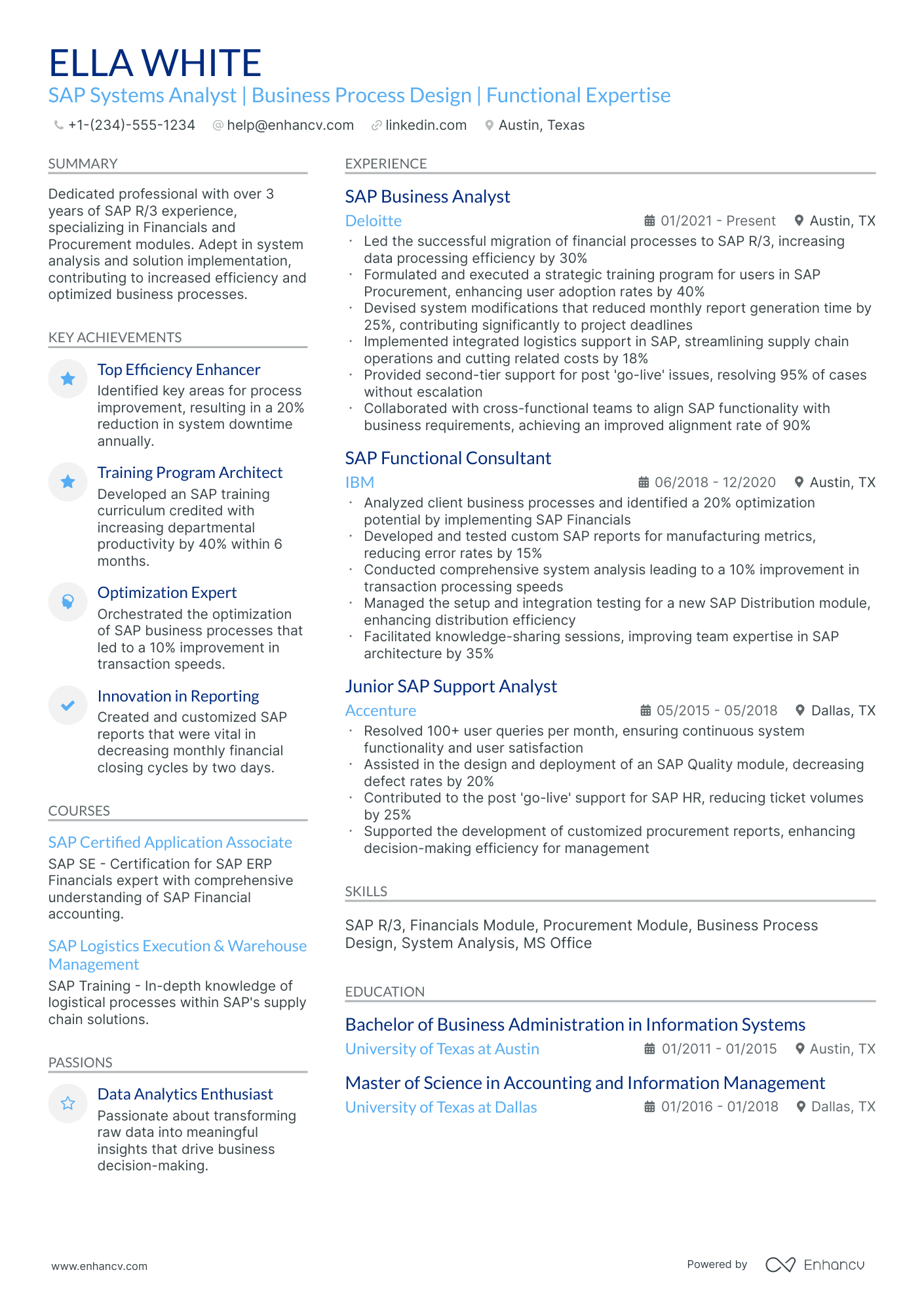Many SAP business analyst resumes fail because they list modules and tasks but don't map work to business outcomes or end-to-end process changes. That matters when an applicant tracking system filters keywords and recruiters scan fast in a crowded market. Understanding how to make your resume stand out is critical in this competitive field.
A strong resume shows what you improved, delivered, or de-risked. You should quantify cycle-time reductions, defect leakage, close speed, adoption rates, and audit findings avoided. Highlight scope, stakeholders, and delivery impact across releases, integrations, and data migrations.
Key takeaways
- Map every SAP experience bullet to a measurable business outcome, not a task description.
- Tailor module names, process terminology, and KPIs directly to each job posting.
- Use reverse-chronological format if you have experience; use hybrid format if you're transitioning.
- Quantify cycle time, adoption rates, cost savings, and defect reductions to prove impact.
- Place certifications above education when they're recent and the role demands SAP credentials.
- Tie every listed skill to a specific project or result in your experience section.
- Use Enhancv to turn vague job duties into focused, recruiter-ready resume bullets faster.
How to format a SAP business analyst resume
Recruiters hiring for SAP business analyst roles prioritize hands-on experience with specific SAP modules, the ability to bridge business requirements and technical solutions, and measurable process improvements. A clean, well-structured resume format ensures these signals surface quickly during both automated screening and manual review.
I have significant experience in this role—which format should I use?
Use a reverse-chronological format to present your SAP business analyst experience in a clear, linear progression that highlights growing responsibility and domain expertise. Do:
- Lead each role entry with your scope of ownership—number of stakeholders supported, modules covered (such as SAP S/4HANA, MM, FI/CO, or SD), and cross-functional teams you collaborated with.
- Emphasize specific SAP tools, configuration work, and business process domains (procurement, finance, supply chain) relevant to each position.
- Quantify outcomes tied to your analysis, such as process cycle reductions, cost savings, user adoption rates, or successful go-live milestones.
I'm junior or switching into this role—what format works best?
Use a hybrid format that leads with a focused SAP skills section, then supports it with reverse-chronological work history or relevant project experience. Do:
- Place your SAP module knowledge, business process mapping capabilities, and any certifications (such as SAP Certified Application Associate) in a dedicated skills section near the top of the resume.
- Include academic projects, internships, or freelance engagements where you performed requirements gathering, gap analysis, or system testing—even outside a formal SAP business analyst title.
- Connect every listed skill or project to a specific action and a tangible result so recruiters see practical application, not just tool familiarity.
Why not use a functional resume?
A functional format groups skills without tying them to specific employers, timelines, or project contexts, which makes it difficult for recruiters to verify your actual SAP experience depth or assess how you've applied analytical skills in real business environments. A functional resume may make sense in a narrow set of circumstances:
- You're transitioning from a related role (such as SAP developer or business process owner) and need to foreground transferable skills like requirements documentation, stakeholder facilitation, or module configuration.
- You have a significant gap in employment but completed SAP certifications, training, or volunteer consulting during that period.
- Your work history is limited to fewer than two years, and project-based experience is your strongest proof of capability.
- A functional format is acceptable only when you're entering the SAP business analyst field through a career change, have minimal formal work history, or are addressing a resume gap—and only if every skill listed connects directly to a project, certification exercise, or measurable outcome.
With your layout and formatting decisions in place, the next step is determining which sections to include so each one serves a clear purpose on your resume.
What sections should go on a SAP business analyst resume
Recruiters expect to see a clean, role-aligned resume that proves you can translate business needs into SAP solutions and measurable results. Knowing which resume sections to include ensures you cover everything hiring managers look for.
Use this structure for maximum clarity:
- Header
- Summary
- Experience
- Skills
- Projects
- Education
- Certifications
- Optional sections: Awards, Leadership, Languages
Your experience bullets should emphasize business impact, implementation scope, process improvements, stakeholder alignment, and outcomes you delivered across SAP modules and integrations.
Is your resume good enough?
Drop your resume here or choose a file. PDF & DOCX only. Max 2MB file size.
Now that you’ve laid out the key resume components employers expect, you can focus on writing your SAP business analyst experience section to show how you’ve applied them in real work.
How to write your SAP business analyst resume experience
The experience section is where you prove you've delivered real work as a SAP business analyst—through configured modules, optimized processes, and measurable business outcomes. Hiring managers prioritize demonstrated impact over descriptive task lists, so every bullet should connect what you did to the value it created.
Each entry should include:
- Job title
- Company and location (or remote)
- Dates of employment (month and year)
Three to five concise bullet points showing what you owned, how you executed, and what outcomes you delivered:
- Ownership scope: the SAP modules, business processes, functional areas, or implementation workstreams you were directly accountable for managing, configuring, or improving.
- Execution approach: the SAP tools, methodologies, configuration techniques, or requirements-gathering frameworks you used to analyze gaps, define solutions, and deliver work across project phases.
- Value improved: the changes you drove in process efficiency, data accuracy, system performance, reporting reliability, or compliance posture within the SAP environment.
- Collaboration context: how you partnered with functional leads, technical developers, end users, or external consultants to translate business requirements into working SAP solutions.
- Impact delivered: the business outcomes your work produced—expressed through adoption results, process improvements, cost reductions, or successful go-lives rather than a list of daily activities.
Experience bullet formula
A SAP business analyst experience example
✅ Right example - modern, quantified, specific.
SAP business analyst
Apex Manufacturing Group | Chicago, IL
2022–Present
Multi-site industrial manufacturer running SAP S/4HANA across finance, procurement, and supply chain for four plants and 1,200 users.
- Led fit-to-standard workshops and wrote functional specifications for SAP S/4HANA MM and SD enhancements, cutting purchase-to-pay cycle time by 18% and reducing invoice exceptions by 27%.
- Built end-to-end process models in SAP Signavio and BPMN, aligning procurement, finance, and plant stakeholders on a single global template that reduced process variants from 14 to six.
- Partnered with developers to design and test OData services and Fiori apps for requisition approvals, improving mobile approval adoption from 35% to 78% and reducing average approval time by two days.
- Owned requirements, test scripts, and defect triage in Jira and Confluence; executed UAT with super users and stabilized release quality by lowering post-go-live Sev-1 tickets by 42%.
- Developed KPIs and reconciliation dashboards in SAP Analytics Cloud and embedded controls with GRC (governance, risk, and compliance), reducing duplicate vendor risk by 60% and improving audit pass rate to 98%.
Now that you've seen how to structure a strong experience entry, the next step is adjusting it to match the specific job posting you're targeting.
How to tailor your SAP business analyst resume experience
Recruiters evaluate your SAP business analyst resume through both human review and applicant tracking systems. Tailoring your resume to the job description increases your chances of passing both screenings.
Ways to tailor your SAP business analyst experience:
- Match the specific SAP modules listed in the job description.
- Mirror the exact business process terminology the employer uses.
- Reflect KPIs or success criteria the posting highlights.
- Include relevant industry or domain experience the role requires.
- Emphasize compliance or data governance responsibilities when mentioned.
- Align your workflow language with their implementation methodology.
- Highlight cross-functional collaboration models referenced in the posting.
- Reference the reporting or analytics tools the employer specifies.
Tailoring means aligning your real accomplishments with what the role demands, not forcing keywords where they don't belong.
Resume tailoring examples for SAP business analyst
| Job description excerpt | Untailored | Tailored |
|---|---|---|
| "Configure and optimize SAP S/4HANA modules (MM, PP, SD) to support end-to-end supply chain processes across three regional warehouses." | Worked with ERP systems to help improve business operations. | Configured SAP S/4HANA MM, PP, and SD modules to streamline end-to-end supply chain workflows across three regional warehouses, reducing order fulfillment cycle time by 18%. |
| "Gather and document business requirements from cross-functional stakeholders, then translate them into SAP functional specifications using ABAP debugging and SAP Solution Manager." | Collected requirements from different teams and created documentation for IT projects. | Partnered with finance, procurement, and logistics stakeholders to elicit business requirements and author SAP functional specifications, leveraging ABAP debugging and SAP Solution Manager to validate data flows and close 40+ specification gaps before development. |
| "Lead UAT cycles for SAP Fiori-based dashboards, ensuring data accuracy in real-time inventory reporting aligned with ITIL change management standards." | Helped test new software tools and reported issues to the development team. | Led three UAT cycles for SAP Fiori inventory dashboards, writing 85+ test scripts to verify real-time stock accuracy and coordinating defect resolution through ITIL change management protocols—achieving 99.2% data accuracy at go-live. |
Once you’ve aligned your experience with the role’s SAP priorities, quantify your SAP business analyst achievements to show the business impact of that work.
How to quantify your SAP business analyst achievements
Quantifying your achievements proves your SAP impact beyond tasks by showing outcomes. Focus on cycle time, defect leakage, adoption, cost savings, and delivery predictability across SAP modules, integrations, and reporting.
Quantifying examples for SAP business analyst
| Metric | Example |
|---|---|
| Cycle time | "Cut order-to-cash change request cycle time from 18 days to 11 days by tightening SAP Solution Manager workflows and clarifying BRD acceptance criteria." |
| Data quality | "Reduced master data errors by 32% by implementing SAP MDG validations and adding three automated checks in the inbound IDoc mapping." |
| Adoption | "Drove 78% adoption of a new SAP Fiori app within six weeks by redesigning role-based tiles and delivering five targeted enablement sessions." |
| Cost savings | "Saved $240K annually by retiring two legacy reports and consolidating KPI reporting into SAP Analytics Cloud with one governed semantic model." |
| Delivery predictability | "Improved on-time delivery from 62% to 90% across ten sprints by refining backlog grooming, tightening user story scope, and enforcing Definition of Ready." |
Turn vague job duties into measurable, recruiter-ready resume bullets in seconds with Enhancv's Bullet Point Generator.
Once you've crafted strong, impact-driven bullet points, the next step is ensuring your resume highlights the right mix of hard and soft skills that SAP business analyst roles demand.
How to list your hard and soft skills on a SAP business analyst resume
Your skills section shows recruiters and an ATS (applicant tracking system) you can translate business needs into SAP solutions, and it should balance role-specific hard skills with execution-focused soft skills to match how SAP business analysts deliver outcomes. SAP business analyst roles require a blend of:
- Product strategy and discovery skills.
- Data, analytics, and experimentation skills.
- Delivery, execution, and go-to-market discipline.
- Soft skills.
Your skills section should be:
- Scannable (bullet-style grouping).
- Relevant to the job post.
- Backed by proof in experience bullets.
- Updated with current tools.
Place your skills section:
- Above experience if you're junior or switching careers.
- Below experience if you're mid/senior with strong achievements.
Hard skills
- SAP S/4HANA process design
- SAP Fiori requirements
- SAP Activate methodology
- Fit-to-standard workshops
- Business process modeling (BPMN)
- User stories, acceptance criteria
- SAP Solution Manager, JIRA
- Integration mapping, IDoc, API
- Master data governance
- Data migration, LSMW, SAP Data Services
- Test planning, UAT, defect triage
- KPI reporting, Power BI, SQL
Soft skills
- Lead cross-functional workshops
- Translate needs into requirements
- Challenge scope and assumptions
- Prioritize backlog by value
- Align stakeholders on decisions
- Communicate tradeoffs and impact
- Drive UAT readiness and adoption
- Manage risks and dependencies
- Resolve conflicts with facts
- Document decisions and rationale
- Influence without formal authority
- Own outcomes through delivery
How to show your SAP business analyst skills in context
Skills shouldn't live only in a bulleted list on your resume. Browse examples of resume skills to see how top candidates present their capabilities effectively.
They should be demonstrated in:
- Your summary (high-level professional identity)
- Your experience (proof through outcomes)
Here's what both look like in practice.
Summary example
Senior SAP business analyst with eight years in pharmaceutical supply chain optimization. Skilled in SAP S/4HANA, requirements gathering, and cross-functional stakeholder alignment. Led a global inventory redesign that reduced carrying costs by 22%.
- Reflects senior-level experience clearly
- Names specific SAP tools and modules
- Leads with a measurable cost outcome
- Highlights stakeholder collaboration skills
Experience example
Senior SAP Business Analyst
Vantage Logistics Group | Remote
March 2020–Present
- Configured SAP MM and WM modules alongside warehouse teams, cutting order fulfillment errors by 34% within six months.
- Partnered with finance and operations stakeholders to redesign procurement workflows in SAP S/4HANA, saving $1.2M annually.
- Led UAT cycles and translated business requirements into functional specs, accelerating the ERP migration timeline by three weeks.
- Every bullet includes measurable proof
- Skills appear naturally through real outcomes
Once you’ve tied your SAP business analyst skills to real outcomes and examples, the next step is to apply that same approach to building a SAP business analyst resume when you don’t have formal experience.
How do I write a SAP business analyst resume with no experience
Even without full-time experience, you can demonstrate readiness through:
- SAP S/4HANA simulation case studies
- University ERP or SAP projects
- SAP learning hub coursework
- Business process mapping assignments
- Requirements workshops in class projects
- Data analysis in Excel and SQL
- Internship in operations or finance
- ERP user support volunteer work
If you're in this situation, our guide on writing a resume without work experience can help you structure your application effectively.
Focus on:
- SAP business process knowledge
- Requirements and user story artifacts
- Data validation and reporting outputs
- Cross-functional domain exposure
Resume format tip for entry-level SAP business analyst
Use a combination resume format because it highlights SAP business analyst skills and projects before limited work history. Do:
- Put a "Projects" section above experience.
- List SAP modules and tools used.
- Show deliverables: process maps, requirements, test cases.
- Quantify results: time saved, errors reduced.
- Tailor keywords to each job posting.
- Built SAP S/4HANA order-to-cash test scripts and defect log, improving first-pass test success from 70% to 92% across three end-to-end scenarios.
Once you've positioned your transferable strengths to compensate for limited experience, your education section becomes the next critical area to leverage effectively.
How to list your education on a SAP business analyst resume
Your education section helps hiring teams confirm you have the foundational knowledge needed. It validates your analytical, technical, and business skills relevant to the SAP business analyst role.
Include:
- Degree name
- Institution
- Location
- Graduation year
- Relevant coursework (for juniors or entry-level candidates)
- Honors & GPA (if 3.5 or higher)
Skip month and day details—list the graduation year only.
Here's a strong education entry tailored to the SAP business analyst role.
Example education entry
Bachelor of Science in Management Information Systems
Pennsylvania State University, University Park, PA
Graduated 2021
GPA: 3.7/4.0
- Relevant Coursework: Enterprise Resource Planning, Business Process Analysis, Database Management, Systems Integration
- Honors: Dean's List (six semesters), Beta Gamma Sigma Honor Society
How to list your certifications on a SAP business analyst resume
Certifications show your commitment to learning, confirm tool proficiency, and signal industry relevance as a SAP business analyst. They also help recruiters verify skills quickly when your experience spans different modules or industries.
Include:
- Certificate name
- Issuing organization
- Year
- Optional: credential ID or URL
- Place certifications below education when they're older, less relevant, or you already have strong SAP business analyst experience that leads your resume.
- Place certifications above education when they're recent, highly relevant, or required for the role and you need to prove SAP business analyst readiness fast.
Best certifications for your SAP business analyst resume
- SAP Certified Application Associate—SAP S/4HANA Business Process Integration
- SAP Certified Application Associate—SAP S/4HANA Financial Accounting
- SAP Certified Application Associate—SAP S/4HANA Sales
- SAP Certified Application Associate—SAP S/4HANA Sourcing and Procurement
- PMI Professional in Business Analysis (PMI-PBA)
- IIBA Certified Business Analysis Professional (CBAP)
- ITIL 4 Foundation
Once you’ve positioned your credentials where recruiters will see them quickly, shift to your SAP business analyst resume summary to connect those qualifications to the value you deliver.
How to write your SAP business analyst resume summary
Your resume summary is the first thing a recruiter reads. A sharp, specific opening sets the tone and decides whether they keep scrolling or reach for the phone.
Keep it to three to four lines, with:
- Your title and total years of SAP business analyst experience.
- The domain or industry you specialize in, such as manufacturing, finance, or supply chain.
- Core tools and skills like SAP ERP, S/4HANA, FICO, MM, or requirements gathering.
- One or two quantified achievements that prove your impact.
- Soft skills tied to real outcomes, such as cross-functional collaboration that shortened delivery timelines.
PRO TIP
At a mid-level SAP business analyst position, focus on the specific modules you've worked in and measurable project contributions. Highlight process improvements, stakeholder collaboration, and tools you've mastered. Avoid vague phrases like "passionate team player" or "results-driven professional." Every word should point to something concrete you've done or delivered.
Example summary for a SAP business analyst
SAP business analyst with five years of experience in manufacturing and supply chain modules. Led requirements gathering for an S/4HANA migration, reducing order processing time by 30%. Skilled in cross-functional stakeholder alignment and end-to-end testing.
Optimize your resume summary and objective for ATS
Drop your resume here or choose a file.
PDF & DOCX only. Max 2MB file size.
Now that your summary captures the value you bring, make sure your header presents your contact details and professional identity just as effectively.
What to include in a SAP business analyst resume header
A resume header is the top section with your identity and contact details, and it drives visibility, credibility, and fast recruiter screening for a SAP business analyst.
Essential resume header elements
- Full name
- Tailored job title and headline
- Location
- Phone number
- Professional email
- GitHub link
- Portfolio link
A LinkedIn link helps recruiters verify experience quickly and supports screening.
Don't include a photo on a SAP business analyst resume unless the role is explicitly front-facing or appearance-dependent.
Match your header job title to the posting and align your headline with the SAP modules and business processes you support.
SAP business analyst resume header
Jordan Taylor
SAP business analyst | SAP S/4HANA Order-to-Cash, Requirements, UAT
Austin, TX
(512) 555-01XX
jordan.taylor@enhancv.com
github.com/jordantaylor
jordantaylor.com
linkedin.com/in/jordantaylor
Once your contact details and SAP-focused professional identifiers are clear at the top, add relevant additional sections to reinforce your fit and round out the resume.
Additional sections for SAP business analyst resumes
Extra resume sections help you stand out when they highlight specialized skills, industry credibility, or global readiness relevant to SAP work. For example, listing language skills can be especially valuable for SAP roles that span multiple regions.
- Languages
- SAP certifications
- Industry publications
- Professional affiliations
- Volunteer experience
- Conferences and speaking engagements
- Hobbies and interests
Once you've rounded out your resume with the right supplementary sections, it's worth turning your attention to the document that often accompanies it—your cover letter.
Do SAP business analyst resumes need a cover letter
A cover letter isn't required for a SAP business analyst, but it often helps. It matters most in competitive roles or when hiring teams expect context beyond the resume. It can also help when your experience doesn't match the job title exactly.
Use a cover letter to add context your resume can't show:
- Explain role and team fit by linking your strengths to the SAP business analyst responsibilities in the posting.
- Highlight one or two projects with outcomes, such as process improvements, defect reduction, or faster reporting cycles.
- Show product and business understanding by naming SAP modules, key users, and the decisions your analysis supported.
- Address career transitions or non-obvious experience by mapping prior work to SAP business analyst skills and deliverables.
Drop your resume here or choose a file.
PDF & DOCX only. Max 2MB file size.
Even if you decide a cover letter won’t add value for your SAP business analyst application, you can use AI to improve your SAP business analyst resume to strengthen the document recruiters will review first.
Using AI to improve your SAP business analyst resume
AI can sharpen your resume's clarity, structure, and impact. It helps refine language and highlight measurable results. But overuse strips authenticity. Once your content is clear and role-aligned, step away from AI. If you're unsure where to start, explore ChatGPT resume writing prompts for practical ideas.
Here are 10 practical prompts to strengthen specific sections of your resume:
Strengthen your summary
Quantify experience bullets
Align skills to job posts
Clarify project contributions
Improve action verbs
Tailor certification descriptions
Tighten education details
Remove filler language
Highlight cross-functional work
Focus on configuration details
Conclusion
A strong SAP business analyst resume proves impact with measurable outcomes, role-specific skills, and a clear structure. It highlights SAP expertise, process improvement, requirements, testing, and stakeholder management. It uses concise bullets, consistent formatting, and results that hiring teams can verify.
This approach shows you’re ready for today’s hiring market and near-future needs. It helps recruiters scan fast, understand your value, and match you to SAP business analyst roles. Keep it focused, specific, and easy to read.
